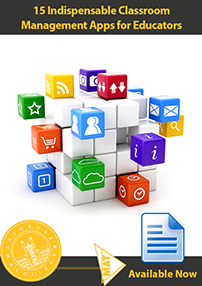 Although many of us don’t realize it until we step foot into our own classrooms, we quickly learn that facilitating a lively, but controlled, classroom discussion is truly an art form. While most of us understand the value of a good question, we may not necessarily know how to make questions engaging or relevant to our students!
Although many of us don’t realize it until we step foot into our own classrooms, we quickly learn that facilitating a lively, but controlled, classroom discussion is truly an art form. While most of us understand the value of a good question, we may not necessarily know how to make questions engaging or relevant to our students!
In their book Asking Better Questions Norah Morgan and Juliana Saxton offer some helpful tips that should not only help you become a better facilitator, but teach you to ask thought-provoking questions that:
- Draw upon students’ previous knowledge
- Test their comprehension
- Push students to problem solve
- Encourage analysis
- Invite creativity
- Promote evaluation
Before we continue, keep in mind that neither the categories nor the questions in them need to be used in any specific order. We second Morgan and Saxton’s suggestions that “Questions should spring from interest on the part of the teacher and of the students,” not a predetermined script!
Asking Better Questions: 6 Ways to Improve Classroom Discussions
Questions that draw upon knowledge (Remembering)
Being able to remember and articulate what we already know is an important skill. To help students draw upon the knowledge they already have, begin questions with the following:
- Who?
- What?
- When?
- Where?
- Why?
- How?
For example, you might ask, “Where might you find a haystack today?” or “How does Franny react when Zooey lectures her in chapter two?”
Questions that test comprehension (understanding)
It’s one thing to regurgitate answers and another thing entirely to be able to reword, rephrase, interpret and describe something in one’s own language. To help our students hone this skill, use the following questions:
- What is meant by…?
- Can you rephrase…?
- Can you describe…?
- What is the difference between…?
- What is the main idea of…?
Questions that require application (solving)
It is important that we teach our students to problem solve and take what they’ve already learned and apply it to other situations. To help them hone this skill, try asking the following questions:
- Whom would you choose?
- What might happen if?
- How can…?
- What examples…?
- How would you…?
Questions that encourage analysis (reasoning)
We want our students to be able to support their arguments and opinions, and organize their ideas into logical patterns of understanding, right? If so, use the following phrases to provoke reasoning:
- I wonder why…?
- I wonder what would happen if…?
- What if…?
- What could have been the reason…?
- If it a fact that…?
- Should we assume that…?
Questions that invite synthesis (creating)
Our students are creative people; we just need to give them the opportunity to express this side of themselves. To invite creativity, use the following phrases:
- How could we/you…?
- How can…?
- What if…?
- I wonder how…?
- Do you suppose that…?
Questions that promote evaluation (judge)
Everyone has an opinion, but we want our students’ opinions to be grounded in reason. We also want them to be able to look critically at others’ arguments. To promote evaluation, use the following phrases:
- What might be better…?
- Does it matter that…?
- Would you agree that…?
- Would it be better if…?
- What is your opinion…?
- I wonder if we (you/they) were right to…?
© 2025 Created by Steve Hargadon.
Powered by
![]()
